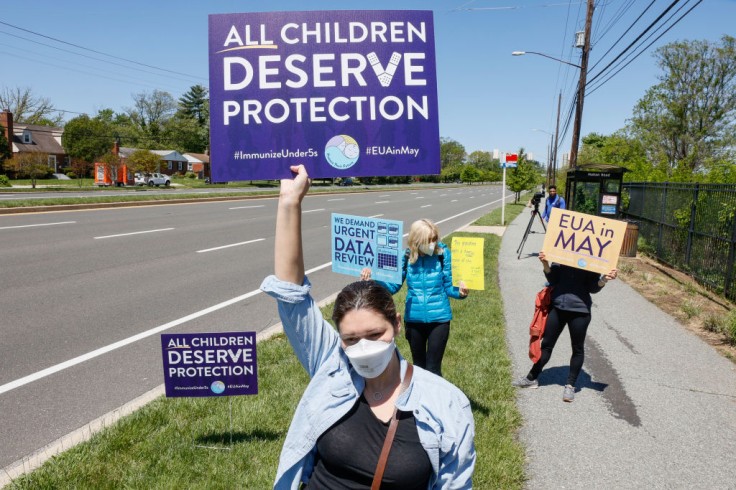
The Centers for Disease Control and Prevention (CDC) has signed off on vaccines for Americans younger than the age of 5 years old, allowing shots to start immediately. The decision came a day after the Food and Drug Administration (FDA) issued three new authorizations for COVID-19 vaccines.
The FDA authorized on Friday, June 18, Moderna shots for kids between 6 months and 5 years old, and Pfizer shots for children between 6 months and 4 years old. Additionally, the agency green-lit Moderna shots for children ages 6 to 17. Previously, the only shot available for that particular age group was Pfizer's, which the FDA authorized last year for children 5 and older.
Dr. Ashish Jha, the White House Covid-19 response coordinator, told NBC News at a briefing earlier this month, that they expect vaccinations will begin in earnest as early as Tuesday, June 21, and really roll on throughout that week. Jha noted that many doctors' offices may be closed for the Juneteenth federal holiday on Monday, June 20.
What parents should know about the COVID vaccines
Here is what parents should know about their COVID vaccine options, the rollout timeline and expected side effects of the shots that will be administered to their kids.
According to White House officials, vaccines would be made available for the under 5 age group at thousands of sites, including community health centers, pharmacies, hospitals, and doctors' offices. Jha said that they expect the vast majority of these children will be vaccinated by their primary care providers.
Most states don't allow pharmacists to vaccinate kids younger than the age of 3 because of a federal law enacted in 2005 and amended back in 2020. Because of that law, a Walgreens spokesperson said that its pharmacies plan to administer COVID vaccines to kids age 3 and up. A CVS spokesperson said the company would administer shots to kids age 18 months through 4 years old at its 1,100 MinuteClinic locations rather than at traditional pharmacies.
Jha said they have asked states to distribute the initial tranche of doses to their highest-priority sites, including those serving the highest-risk kids and hardest-to-reach areas, and they have also asked them to prioritize sites that can handle large volumes, such as children's hospitals.
Read Also : Long Wait is Finally Over for US Parents as CDC Approves COVID Vaccines for Youngest Children
Difference between Pfizer and Moderna's pediatric COVID vaccines
Moderna's and Pfizer's pediatric COVID vaccines differ in several ways. Moderna's COVID vaccine for young children consists of two doses given four weeks apart. Each dose is one-quarter of the adult dose. Pfizer's vaccine for the littlest kids is a three-dose series, with the first two shots given three weeks apart and the third shot at least two months after the second dose. Each dose is one-tenth of Pfizer's adult version.
The shots of Pfizer and Moderna also showed different efficacies in clinical trials. Pfizer's COVID vaccine reduced the risk of symptomatic infection by 80 percent in kids between the ages of 6 months and 4 years but that is based on a small number of cases, according to The Hill. Moderna's COVID vaccine had an efficacy of 37 percent in children age 2 to 5 years old, and 51 percent in kids age 6 to 23 months.
Both COVID vaccines of Pfizer and Moderna produced mild side effects in young kids. Many trial participants experienced pain at the injection site, irritability, and sleepiness.